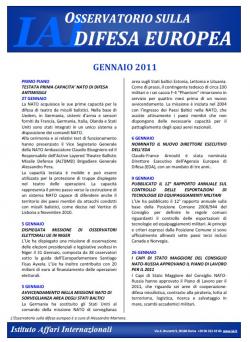Observatory on European defence, December 2004

2 December 2004
EU Missions - Althea, EUPM, Bosnia and Herzegovina
On 2 December, the EU took over the political control and strategic direction of the Althea military mission in Bosnia-Herzegovina, replacing the NATO SFOR operation. The mission involves 7,000 men (the largest ESDP mission so far) and is being carried out in the framework of the Berlin Plus arrangements between the EU and NATO. The Atlantic Alliance maintains a Headquarters in Sarajevo, to deal with reform of the local armed forces, the fight against terrorism and the pursuit of war criminals.
Also within the framework of the Althea mission, the EU COPS appointed Italian General Ciro Cocuzza, Chief of Military Staff of the NATO Command AFSOUTH, to the position of Chief of the EU command in Naples.
On 6 December, the Council allocated 14 million euros, financed by the EU general budget, to cover the operational costs of the EU police mission in Bosnia-Herzegovina (EUPM).
7 December 2004
EU Missions - EUPOL Kinshasa, Congo
Following the request from the local government, the EU decided to launch a monitoring and consultation mission for local police forces in Kinshasa, Democratic Republic of Congo.
The mission will involve 30 people for a year, starting January 2005; the cost foreseen is 4.3 million euros.
13-14 December 2004
General Affairs and External Relations Council - ESDP, Middle East, Iran, China
The EU General Affairs and External Relations Council (GAERC) discussed a broad agenda concerning ESDP and analysed several crisis areas.
The Report on ESDP submitted by the Presidency was approved: it promotes the creation by the end of 2005 of a planning Cell for EU military and civilian missions and the development of EU capabilities through the definition, by springtime 2005, of the military catalogue related to the Headline Goal 2010 and the strengthening of civil capabilities in accordance with the targets scheduled for 2008.
In view of the 16-17 December European Council, the GAERC discussed the situation in the Middle East; previously, on 10 December the European Commission announced that it would send 260 observers to the Palestinian presidential elections scheduled for 9 January 2005.
The Council expressed its support for the negotiations undertaken by France, Germany, and the United Kingdom with Iran, aimed at reaching a long-term agreement to guarantee the non-proliferation of nuclear weapons in Iran, in exchange for the development of political, commercial and economic relations with Europe.
The GAERC discussed the lifting of the arms embargo on China, relating this controversial measure to the strengthening of the EU Code of Conduct on arms export and to respect of human rights by Chinese authorities.
The 8 December EU-China bilateral meeting issued a joint communication in accordance with that and a joint declaration on bilateral cooperation on non-proliferation matters.
16-17 December 2004
European Council - Enlargement, Non-Proliferation, Terrorism, Ukraine, China
The European Council, attended by UN Secretary General Kofi Annan, adopted several decisions concerning European security policy.
Regarding enlargement, the start of negotiations with Turkey has been scheduled for 3 October 2005 and with Croatia for 17 March 2005; the signature of the Treaty of adhesion for Bulgaria and Romania will be held on 25-26 April, they will accede to the EU on 1 January 2007.
The Council adopted the report on ESDP submitted by the Presidency and endorsed by the 13-14 December GAERC, as well as the report on non-proliferation which includes recommendations on control systems for dual-use goods export and the commitment to use all possible means to counter the threat of the proliferation of weapons of mass destruction and their means of delivery.
The Council reaffirmed its commitment to the fight against terrorism through a global and integrated policy strengthening internal and international cooperation on judicial and police matters, intelligence and civil protection. Further measures against the financing of terrorism were requested; in that regard, the 7 December ECOFIN Council approved a draft Directive against money laundering.
Previously, on 2 December, the Justice and Home Affairs Council adopted the revised version of the EU action plan on terrorism. Several countries are tardy in their application of those measures (Italy in particular), but the European Commission does not have the power to initiate infraction procedures in this field.
The Council has followed the evolution of the internal political crisis in Ukraine and called for strengthened bilateral relations in line with the European Neighbourhood Policy after the free presidential elections scheduled for 26 December.
Lastly, in line with the outcome of the 13-14 December GAERC meeting, the intention to lift the arms embargo on China was confirmed; the Council and the European Commission shall examine the feasibility of a framework agreement between the EU and China including these aspects.
-
Details
Roma, Istituto affari internazionali, 2004 -
Issue
04/12


